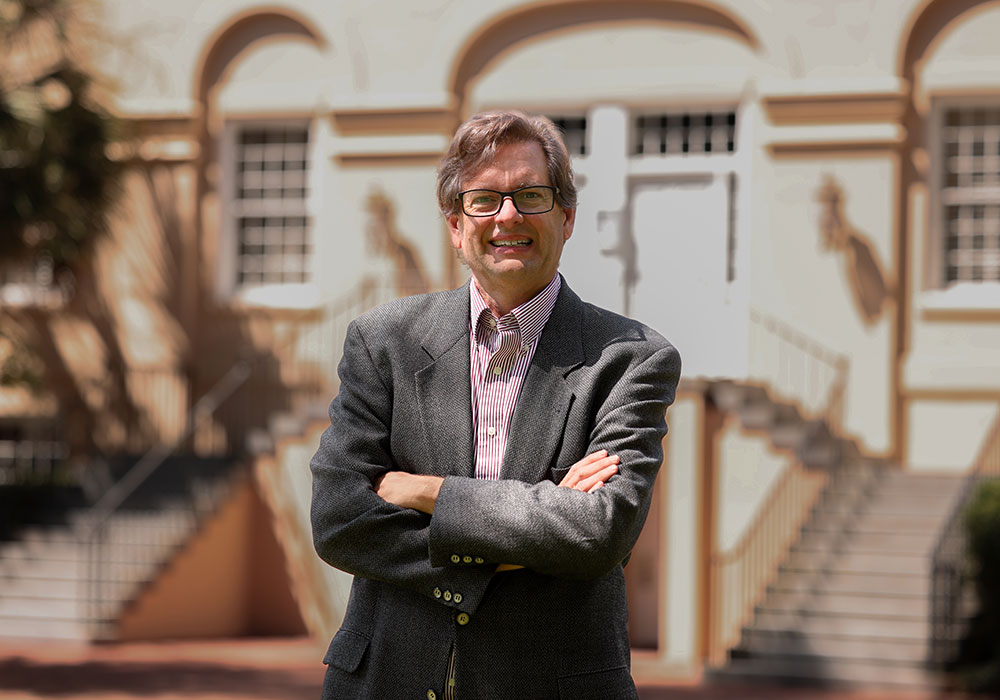His colleagues call him The Spatula.
Scott Smith has a knack for recruiting hospitality majors. Time and time again, unwitting students in Smith’s Introduction to Hospitality Management class experience The Spatula firsthand.
The nickname, he explains with a flipping motion, refers to his ability to change students minds about their career path.
“There are people who come into that class who think, ‘I’m just here for the easy A,’” says Smith, an associate professor in the College of Hospitality, Retail and Sport Management. “Then they listen. They start to say, ‘That sounds pretty cool,’ or ‘I think I could do that.’ Before you know it, they’ve changed their majors to hospitality because I turned them.”
As a 2024 Garnet Apple Award for Teaching Innovation recipient, Smith has a reputation for excellence in everything he teaches, not just Intro to Hospitality Management. But, to hear him tell it, success is as much about being in the right place at the right time as it is about aptitude.
Case in point: In grade school, Smith lived in Orlando, Florida, when the Walt Disney World Resort opened its doors in 1971, transforming the swampy military town into a world-class tourist destination. When it was time for Smith to get a job at 16, Disney was the obvious choice. What he learned changed his understanding of the industry.
“Looking back now, it was an incredible stroke of luck because Disney is the gold standard when it comes to things like hospitality, guest services and providing top-notch entertainment,” he says. “So I just thought it was normal.”
He rotated through various roles at the park, including management and operating rides, but his career aspirations didn’t fully materialize until he landed a trainer position at the Magic Kingdom’s Haunted Mansion attraction.
It’s amazing to me the number of students who aren’t straight-A students, but they just have that intangible quality of hospitality. It’s our job to find those people and let them know there’s an industry for them.
“That when I figured out that, yeah, you can be a manager, you can be the person in charge. But where I really got the most satisfaction,” he says, “was taking someone who was brand new and training them, whether it be for two days or five days. And by the time I was finished with them, they were a productive cast member. That’s when I started to think, ‘What is teaching?’ It’s really training.”
And just like that, The Spatula was born.
Smith himself was flipped earlier in his career. After enrolling in the University of Central Florida’s brand-new hospitality management program, he caught the eye of Professor Bob Ashley, who became his mentor and opened his eyes to the food and beverage side of the industry. While Smith admits he was never particularly gifted in his general education classes, he excelled in business and hospitality. Ashley and other professors recognized his potential and encouraged him to stick with it.
Today, he finds himself doing the same thing — looking for students who are cut out for hospitality and then pointing them toward possible careers.
“We can train you how to run a computer or how to cook food or whatever, but we can’t train you for attitude,” he says. “So we’re always looking for people with the right attitude. It’s amazing to me the number of students who aren’t straight-A students, but they just have that intangible quality of hospitality. It’s our job to find those people and let them know there’s an industry for them.”
So how do you find those students in a 100-person intro class? Smith assigns a personal reflection paper at the beginning of the semester so students can share their specific interests. If someone is interested in working at Disney — and many are — he’ll return the paper with a note to join the Theme Parks and Attractions club he created so they can get tips on landing an internship. He might even urge them to consider his Theme Parks and Attractions Maymester class, which includes a whirlwind week in Orlando. If they’re interested in working internationally, he’ll mention the exchange program he’s about to launch with the University of Angers in France.
From there, they need to learn the industry basics. Instead of traditional lectures, Smith has developed interactive classroom exercises so students can better understand the material’s relevance.
For example, he illustrates tourism economics in Intro to Hospitality Management by creating a fictitious island, assigning students roles within the island’s economy and then letting them watch how Monopoly money cycles through it.
Students in his more advanced Hospitality Revenue Management class learn how to maximize hotel revenue through his original simulation exercise, “Game of Phones,” a nod to the hit HBO fantasy drama Game of Thrones. The forecasting game is highly competitive — participants vie for two coveted paper Burger King crowns — and the element of surprise is an important aspect of the learning process. How exactly it works is a carefully guarded secret.
“They get into it, especially the ones who are competitive,” he says. “And, quite frankly, if you know you’re going to be in revenue management, you have to be competitive. So they yell and scream and cry. They get frustrated when they make the wrong decision and cheer when they make the right one. They’re learning — they just don’t know it.”
But eventually it dawns on them when they complete the class and go from hating numbers to wanting jobs working with them, or when they take Smith’s advice and land the Disney internship of their dreams. Like their teacher, they ended up in the right place at the right time and discovered their purpose. Seeing that happen reminds Smith that he’s found his purpose, too.
“It’s like hitting the lottery,” he says. “Knowing that you took someone, you saw the potential in them, and you didn’t give up on them. It’s the best thing in the world.”
